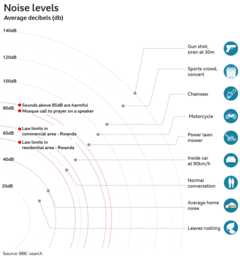
Muslims marking the holy month of Ramadan in Rwanda are not being summoned by early morning calls to prayer, and may never be again.
Last month the authorities banned the use of loudspeakers on mosques in the early hours of the day, saying they violated noise pollution laws that forbid noise over 55 decibels in the day and 45 decibels at night in residential areas.
“The decision violated our rights to practise our faith,” says 55-year-old Zaina Mukamabano who lives in the capital city, Kigali. She says it’s the first time in her life that there’s been no call to prayer, or “adhan” as it is called in Arabic, in the mornings during Ramadan.
The practice of attaching loudspeakers to the minarets on mosques began in Asia in the 1930s and spread across the globe. Five calls are made per day, to summon the faithful for their five daily prayers.
Rwandan authorities say that residents had complained about the earliest call to prayer – which happens between 04:30 and 04:49 and lasts about two or three minutes.
“We are not happy… during Ramadan it is adhan which tells us that it is time to start fasting, and not all Muslims in Rwanda have alarm clocks,” says another resident, Nuhu Bihibindi.

Ms Mukamabano says the government could have told mosques to simply turn down the volume, “just like they tell bars to limit the volume on their music”.
“Adhan is our culture, it is our faith, banning it is upsetting Muslims, not having it during Ramadan is more painful,” she says.
Another Kigali resident, Issa Karim Mugabo, says he and others are now considering taking the government to court.
But Sheikh Souleiman Mbarushimana, an advisor to Rwanda’s mufti, or Islamic scholar, says Muslim leaders had already discussed the matter with the government and agreed upon the decision.
“Muslims say their right to faith was violated… but the authorities have told us [the morning call to prayer] is banned for the common good,” Mr Mbarushimana says.
“We said that we have to agree and move on, because our faith also calls us to respect the authorities’ decision.”
